Backpacker Medics share stories from Rohingya refugees
HUNDREDS of thousands of refugees have fled Myanmar in recent months. Those survivors are being treated by an Australian group of medics, who are now sharing their stories. Warning: Very confronting content.

WARNING: VERY CONFRONTING CONTENT
ON AUGUST 25, militant forces, allegedly tied to the Myanmar government, began a systematic attack on Rohingya villages in the west of the country.
The Rohingya people are a minority Muslim population in Myanmar. Before late August, there were around 1.1 million of them in the country.
It’s unknown how many people have been killed in the attacks, but stories from survivors are horrific.
Many of them tell of their entire village being burned, of gunmen opening fire on them in the middle of the night while they slept getting many of them in the feet so they wouldn’t be able to walk.
Stories of able-bodied men being killed, women and children being shot and beaten as they tried to flee. There is even a story of a woman’s baby being thrown on a fire.
Since the attacks began, more than 600,000 people have fled across the border to Bangladesh. Latest reports are of severe water shortages which will seriously exacerbate a situation that is already so desperate.
It is believed that less than a third of the population remain in Myanmar.
Backpacker Medics are an Australian group of doctors, paramedics, nurses and psychologists who are often the first medical professionals to treat refugees fleeing this kind horror.
The team leaders of Backpacker Medics — all with military backgrounds — use their skills to get to dangerous locations as quickly as possible, treating those in dire need and stretchering the worst cases back to the medical clinics in the camps.
Here are some of their personal accounts of their experiences on the ground.
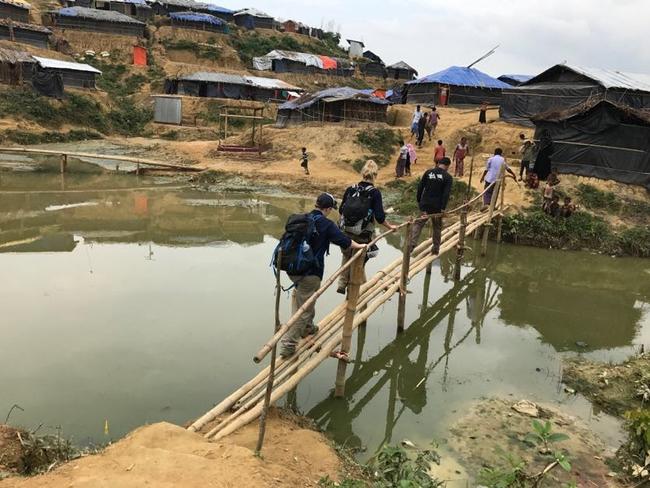
DR KATE BAECHER, CLINICAL PSYCHOLOGIST, NSW
Asna*, 25, is towards the end of her pregnancy when she presents to her local hospital in the Rakhine State. It is the only medical service in the area and is run and staffed by the Myanmar military.
She tells the doctor that she is experiencing cramps and receives “emergency surgery” (an
emergency caesarean) — performed without any anaesthetic.
She is awake and fully aware as she watches the military doctor slice open her abdomen and take her child out. She hears the child cry briefly and catches one, fleeting glance of it before she is heavily sedated.
When she awakes — an unknown amount of time later — she is told that her child is dead. She is sent back to her village where a friend tries to stitch up her bleeding, disfigured abdomen. Within hours, infection begins and she becomes feverish and extremely unwell.
The military come to her village two nights later. She watches as the men are corralled into an area near the canal and systematically executed.
The women and children begin to run. Of course, she can’t run because of her condition. Instead, she finds some bushes to hide in, and pretends to be dead. The pool around her from her still-bleeding abdomen assists in this cover.
She is found two days later by another injured — but alive — village member. Together they make their way towards the river, and are assisted across by friends of the family.
She now sits in front of me, telling me this story, emotionless, dissociated, in a state of pure trauma.
She has lost a child. Her immediate family are all deceased. Her world is unrecognisable to her.
* Name has been changed.
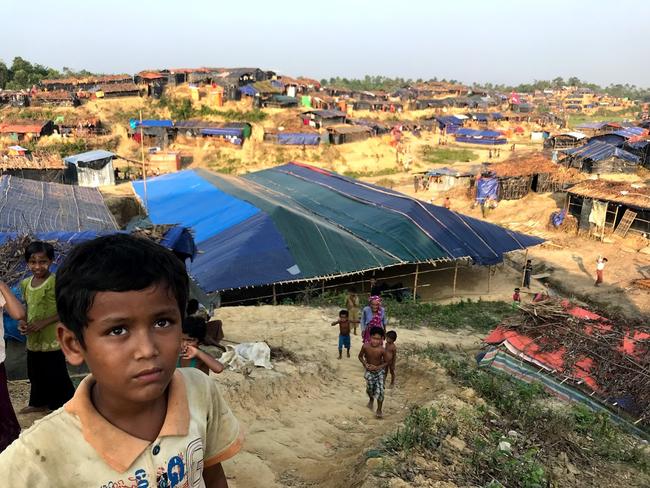
NATHAN BURNS, FOUNDER, TASMANIA
There is nothing that can prepare you for this- the sheer crush of human bodies, the frenzied existence, the vacant, traumatised stares of children, the stench, the dust and the maggots swarming in the latrines.
There is no relief- not for any of the senses, let alone the heart. At every turn swarms life, cheek-and-jowl existence in the most literal sense- whole families crammed into stifling shelters, not a spare inch of land left unused.
There is no relief that can be sought; not one skerrick of comfort. It is approaching winter, yet the sun beats down relentlessly, baking the clay into which lives are carved. Dust plumes permeate every tiny corner, invading already violated lives. In a few weeks the second monsoon will come and wash away the toil- the harsh deluge tearing through narrow, hand-carved paths, and across the floors of makeshift homes.
Any attempt to capture the extent of these camps is futile. Mere months ago wild elephants tramped through these jungles on their way to find water, now the throng of almost 700,000 human feet lay the earth bare and lifeless. Stagnant, effluent-filled water pools in the gullies between dwellings, swarming with the refuse of a population in turmoil. Hand-pumped wells draw muddy, rancid, fluid from the ground, splattering the clothes of children as they watch idly. A man hawks loudly and spits beetle-nut into a purpose-dug pit. It spatters red against the sides and leaves a lasting impression that, most probably, this is also where the dead are buried.
A boy stands in the middle of the path, his eyes intent his stare relentless- his suffering palpable. With his gaze, he questions: what kind of tragedy, what level of pain would you have to experience to flee your homeland to come and live like this? I take his picture, permanently capturing his intensity, his bravery, his existence.
Yet, it is he who has left the indelible mark.
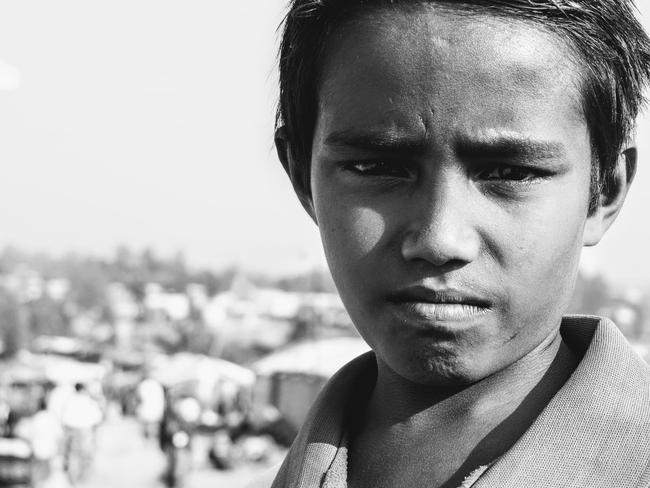
SHANE, PARAMEDIC, VICTORIA
There will be days when you think: “I can’t do it today”.
The breakfast you eat will be nearly inedible after a few days. It’s exactly the same, everyday. You’ll crave fruit and salad but it’s Bengali roulette to eat anything raw or washed. You need to be nearly paranoid with anything you touch and put near your mouth.
The smell from the latrines is overpowering. The flies thick. The noise constant. Water contamination likely. Dust when dry and thick heavy mud when wet. The drive to and from the camps is long and full of near misses. You will learn not to look out the windscreen and look out the window instead.
It will be hot, steaming humidity and relentless sun ... you will carry more water than supplies everyday, and drink more water and sweat more than you thought possible.
Yet you still feel a headache and thirst associated with dehydration. The tents are stifling and like ovens. Any physical exertion will be hampered by your sweat. It will sting your eyes, drip from your face and compromise your grip.
You will see and hear stories of despicable violence and heroic endurance that you cannot process, witness injuries that should not have happened to anyone — especially children.
Wonder how harsh their former existence was, that this new life is somehow better.
By end of the day, your muscles will ache and your clothes stink. Your sweat will leave white salt deposits on your clothes. Washing them in a bucket will clean them however, due to the humidity, they will still be wet in the morning. Beggars are present the moment you leave your hotel. They are constant and hard to ignore.
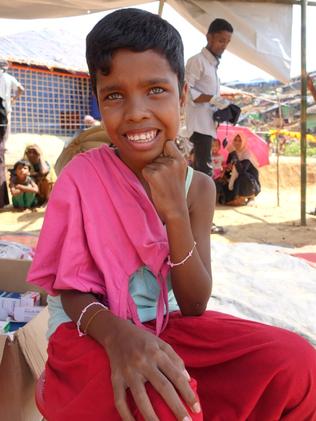
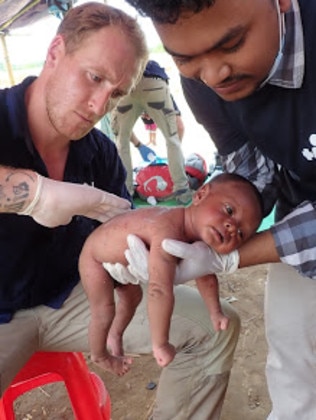
Restocking your bags for the next day is a task. Trying to foresee what you will need to take more of and remove what you may not use. Yet leave enough room for water to keep stocks up for the day, for you, your mates and some dehydrated people you treat.
The cleanliness of your room will be dubious. The air stagnant, the showers cold, the bed hard — but it will be like a cloud at the end of the day. Mornings will be adorned with the Call to Prayer at 4.48am, with all the stray dogs howling in tune.
So, back to the days when you think: “I can’t do it today”. When your alarm goes off ... you will lie there and feel every ache, every tired muscle and the growing unease of seeing everything again.
And then you will think of the kids with their smiles, walking with you and holding your hand. The adults bringing you a chair to sit on when you stop and offering you the little food they have to eat.
The thanks in the eyes of those you treat and their families. The eagerness to help you as you go through the camps. A hand on your back as you cross a creek. Carrying your gear to help you when you tire.
The children playing and laughing. The respect given to you by the big players. The honour of knowing you are one of a few Australian groups on the ground giving healthcare to these beautiful people.
You think of the support from your family and friends back home. You think of the team with you and how you have a bond with them — they have your back and you have theirs.
All these thoughts will make you drag your sorry arse out of bed, get your backpack on, run down the stairs and get out there.
Sometimes you might wonder, what can one person like me actually do? If not enough, it was something. I hear there are more aid agencies over there which means a lot more people doing a lot more. I’m very grateful to have been a part of that. I’m very grateful that on the mornings I woke up and thought ‘I can’t’, I did. As part of a team, we got s**t done.
MEL, PARAMEDIC, VICTORIA
At the start of my journey the hardest part was seeing the kids. Perhaps a legacy of my past, I could look at their injuries and physically feel and see some of what they had gone through.
But it’s not even their physical injuries — as horrific as some were — that gets to you.
It’s hearing their stories, knowing what they have seen, what they have had to endure and how they now find themselves thrown into an adult world without the skills or experience to navigate their way through — that’s the hardest part to take.
In a lot of instances, the people who should be the ones to give them those skills and hold their hands as they negotiate life have been taken from them, right in front of them, in the cruellest of ways.
Despite their innocence being lost and forced to grow up way before their time, many of these kids still manage to smile and find a way to be kids — making toys out of rubbish and friends with those around them.
They run across bamboo bridges with a confidence that eludes us, up and down steep muddy hills so fast they make us look like we are standing still. When they do fall they somehow manage to get back up, even when it’s been a 3m drop complete with double somersault after our bubble blowing has got a little out of hand.
Hearts and minds time for both them and us. Our bubble blowing never stopped because we got bored or tired of it.
But as five kids multiplied to 25 and they were running across bridges — from all directions — to play, the balance between fun and creating more patients tipped sharply one way and we were often left reminding ourselves that we were there to treat patients, not create more.
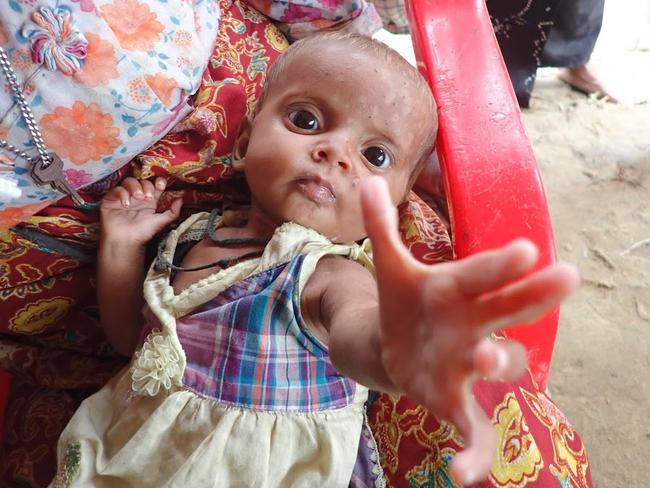
In a place full of constant reminders of just how brutal people can be, how the weak can use weapons to torture and impose fear, I can honestly say I never felt scared to be around them.
One day after walking a three-day old baby and his mother to a clinic as he was yet to feed and knocking on death’s door, I was making my way back through the camp when a 14-year-old boy concerned I was on my own took it upon himself to become my security.
His name was Iman and along our walk I learnt he had lost his parents and two sisters to the violence and how it occurred.
His reason for taking on the role of my security quickly became clear and although I didn’t need security, I’m grateful he chose to walk with me and share his story. I wish our trek back into camp had been 10km not one — simply so I could spend more time with this impressive young man.
I knew he would be unwilling to take anything from me, but he wasn’t getting away without something. Something we had all been giving out a lot of lately. An action that says things words can’t, a gesture that shows they are not alone and never will be. It’s simply a hug.
My way of letting him know that there are still people in the world that care and that I was truly sorry for what had happened to him.
At first, he stood there awkwardly and then I could feel him hug me back. Then as quiet sobs began to escape him, he didn’t want to let go and neither did I.
When we finally parted ways he had a massive smile on his face, I’m not sure if it was because he felt proud of himself for playing his security role so well or simply being able to unload some of the trauma he had been carrying around for so long. Either way it’s a smile from beautiful soul that I won’t forget any time soon.
BRAD STEWART, PARAMEDIC, WA
Today we left Cox’s Bazar early and travelled to another refugee camp near Thaingkhali Khal.
This camp is another congregation point for new arrivals who have crossed the Myanmar border and — as was the case yesterday — there was absolutely no medical aid in place for these people. We had to carry our equipment into this camp as the roads were inaccessible because of the monsoon rain.
Our patients arrived very quickly after our arrival, beginning with the most serious trauma cases. A 14-year-old boy with a gunshot wound to his face, a 20-year-old female with a gunshot wound to her forearm which killed her child, a 17-year-old male with a surgical amputation due to a gun shot wound.
There were numerous presentations of gun shot wounds, bullet grazes and machete wounds.
The team worked continuously throughout the day on malnutrition, dehydration, gastrointestinal, fever, tuberculosis and skin infection cases.
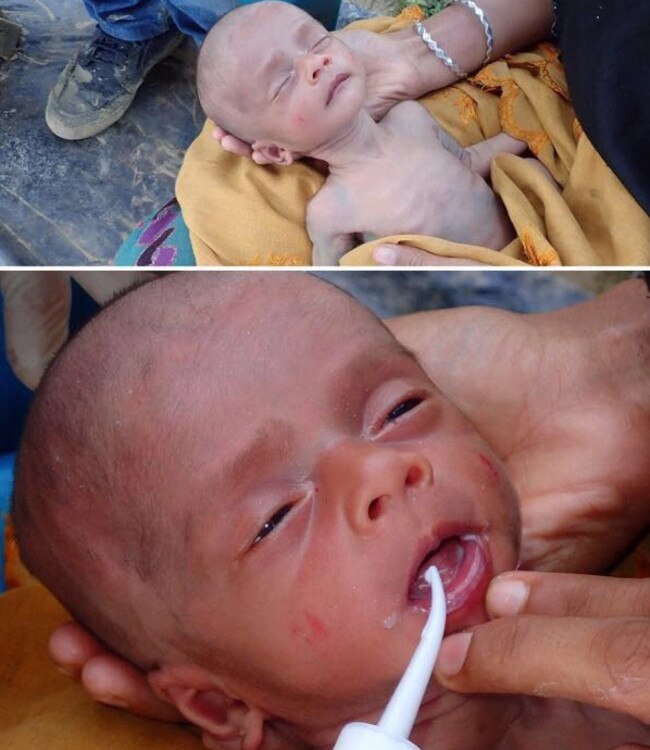
Andrew Strunk transported three patients to the MSF hospital at Kutapalong including a 12-day-old infant who was born in the camp and was yet to feed with severe malnutrition (this was heartbreaking).
While returning from the hospital transfer, Andrew observed an elderly man being beaten by an NGO distributing food resulting in altered conscious state and a suspected head injury. He stabilised the man, and transported him to hospital.
Three tuberculosis patients with exacerbations were taken to a clinic in a taxi paid for by our supporters, DRG (Disaster Response Group).
Two Rohingya helped DRG in the makeshift clinic today; a teacher and paediatrician. On departure, we left medical supplies for the doctor to continue the work, especially with kids.
Tomorrow we will repeat our daily routine, which is proving to be highly effective, in a new location on the border.
Backpacker Medics DRG is the first medical care that many Rohingya refugees are receiving after entering Bangladesh but it’s a drop in the ocean of what’s really needed here.
These are edited stories from Backpacker Medics. For more information, or to donate to the cause, please visit their site, or go to Facebook or Instagram.



